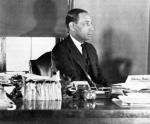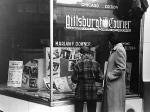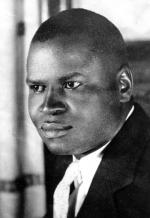![header=[Marker Text] body=[Publisher and editor of the Pittsburgh Courier, 1910-40. He built it into a preeminent Black weekly, a strong voice for civil rights and economic empowerment. It had its headquarters here. Vann was special assistant to the U.S. Attorney General, 1933-35.] sign](kora/files/1/10/1-A-33F-139-ExplorePAHistory-a0l3j5-a_450.gif)
Mouse over for marker text
Name:
Robert Lee Vann
Region:
Pittsburgh Region
County:
Allegheny
Marker Location:
Corner of Center Ave. and Frances St
Dedication Date:
July 13, 1997
Behind the Marker
In a speech he delivered in Cleveland, Ohio, on September 11, 1932, Robert Lee Vann finally said what few African-American leaders had dared to utter in public. "This year I see Negroes voting a Democratic ticket .... I, for one, shall join the ranks of this new army of fearless, courageous, patriotic Negroes who know the difference between blind  partisanship and patriotism."
partisanship and patriotism."
Since the death of Lincoln in 1865, African Americans had been faithful followers of the Republican Party. Despite their rock-ribbed loyalty, black northern politicians had never received political rewards equal to the value of the African-American vote to the GOP. Now, sixty-seven years after Lincoln's assassination, Vann declared "the debt has been paid in full." Although Pennsylvania was one of six states to vote for Herbert Hoover in 1932, that election marked the beginning of the exodus of African Americans from the Republican Party.
Vann was in many ways typical of the black leaders who bolted to the Democratic Party during the Great Depression. Born in 1879 in Ahoskie, North Carolina, he was raised by his mother Lucy Peoples, who worked as a cook for a white family named Vann. Adopting their surname as his own, Robert Lee attended segregated schools in Harrelsville, North Carolina, worked as a tobacco picker, and then won a job as clerk in the local post office.
Vann saved enough money to enroll at the Waters Training School in Winston, North Carolina, then won a scholarship in 1903 to attend the Western University of Pennsylvania (now the University of Pittsburgh). While earning both his undergraduate degree and then a law degree from Western, Vann became the first African-American editor of the school newspaper.
Vann became a professional journalist by way of his law career. After he served as incorporating attorney for the Pittsburgh Courier, a black newspaper founded in 1910 by H. J. Heinz Company security guard Nathanial Harleston and several other African Americans, the Courier's owners asked Vann to become editor because of his college journalism experience. That same year Vann married Jessie Ellen Mathews, from Gettysburg. In the 1910s, African Americans from the South poured into Pittsburgh to take jobs in the city's booming steel industry.
H. J. Heinz Company security guard Nathanial Harleston and several other African Americans, the Courier's owners asked Vann to become editor because of his college journalism experience. That same year Vann married Jessie Ellen Mathews, from Gettysburg. In the 1910s, African Americans from the South poured into Pittsburgh to take jobs in the city's booming steel industry.
Vann's position as editor of the Courier soon enabled him to become a political force in the city. In 1917 he became Pittsburgh's first African-American assistant city solicitor, and in the presidential campaigns of the 1920s helped bring out the black vote for the election of Republican candidates in state and federal elections. In 1930, Vann worked in Gifford Pinchot's successful gubernatorial campaign. After his election, however, Pinchot snubbed the Courier's editor by giving control of black patronage in the state to Edward W. Henry of Philadelphia.
Gifford Pinchot's successful gubernatorial campaign. After his election, however, Pinchot snubbed the Courier's editor by giving control of black patronage in the state to Edward W. Henry of Philadelphia.
In bitterness, Vann left the GOP and joined the Colored Advisory Committee in the national Democratic Party. Under his direction, the Courier then supported the election of Franklin Delano Roosevelt in 1932 and Democrat George H. Earle for governor of Pennsylvania in 1934.
George H. Earle for governor of Pennsylvania in 1934.
Earle rewarded Vann by naming him to five influential committees: the Pennsylvania Committee on Public Assistance, the State Advisory Council on the Federal Writers Project, the Committee on Revising the Pennsylvania Constitution, and the Governor's Commission to Codify the Laws of Pennsylvania. Earle then took an even bolder step. In 1935, he signed into law an equal rights bill, giving African Americans access to places of public accommodation, which black Pennsylvanians had been seeking for decades.
equal rights bill, giving African Americans access to places of public accommodation, which black Pennsylvanians had been seeking for decades.
Vann's support of the Democrat Party also thrust him upon the national stage. In 1935, FDR appointed the former tobacco worker from North Carolina the nation's first black assistant attorney general. Vann was now part of the African-American "Black Cabinet" that advised the president on race. He was thrilled by the appointment, but soon disappointed to learn that the job gave him no political clout in Washington. "The work got a little tedious for me," Vann told writer H. L. Mencken, because "such a job as I held was a splendid pastime for old men." In January 1936, he resigned.
Back in Pittsburgh, Vann focused on making the Pittsburgh Courier one of the nation's most influential black newspapers. In the 1930s the Courier chronicled the plight of blacks in the Great Depression. One of the outstanding features of the Pittsburgh Courier was its coverage of sports. In 1936, Vann traveled to Berlin, Germany, to report on the accomplishments of black track star Jessie Owens during the Olympic Games. As the depression dragged on, Vann became more and more disappointed with both the federal and state New Deal programs.
To keep the support of southern Democrats, FDR permitted the segregation of New Deal work relief programs and accepted gross inequalities in provision of aid. And enforcement of the 1935 Pennsylvania equal rights law was an uphill battle.
uphill battle.
In 1938, when Vann and other African American leaders called for an end to racial discrimination in the military, the Roosevelt administration remained silent on that issue. Disappointed with the slow pace of change, Vann again changed his political allegiance and backed Republican Wendell Wilkie in the 1940 presidential election.
Vann's disillusionment, however, was not shared by all. During the Great Depression, Pennsylvania's black voters, after unwavering allegiance to the party of Lincoln since the 1860s, made the great leap to the Democratic Party. In Philadelphia, a new generation of African-American leaders, including Reverend Marshall Lorenzo Shepard, Raymond Pace and Sadie T. M. Alexander, Robert N. C. Nix, and
Raymond Pace and Sadie T. M. Alexander, Robert N. C. Nix, and  Crystal Bird Faucet mobilized black voters to the party of the Roosevelts, won elective offices, and led the revitalized struggle against racial discrimination.
Crystal Bird Faucet mobilized black voters to the party of the Roosevelts, won elective offices, and led the revitalized struggle against racial discrimination.
Many black Pennsylvanians, like African Americans across the country, felt a deep reverence for FDR, who opened opportunities unseen since Reconstruction. They also admired Eleanor Roosevelt, whose open, public support of equal rights was unprecedented for a First Lady. But black empowerment, as Vann and others discovered, was often times "window dressing."
Robert Vann died on October 24, 1940. Only a few hours after his death, FDR appointed Colonel Benjamin O. Davis the first African-American brigadier general in American history. Vann had worked hard for Davis, visiting the president to lobby for his promotion. In the spirit of its deceased editor, the Courier, in the same issue that it ran Vann's obituary, editorialized that the elevation of Davis and two other African Americans in the Roosevelt administration was "too little and too late."
Since the death of Lincoln in 1865, African Americans had been faithful followers of the Republican Party. Despite their rock-ribbed loyalty, black northern politicians had never received political rewards equal to the value of the African-American vote to the GOP. Now, sixty-seven years after Lincoln's assassination, Vann declared "the debt has been paid in full." Although Pennsylvania was one of six states to vote for Herbert Hoover in 1932, that election marked the beginning of the exodus of African Americans from the Republican Party.
Vann was in many ways typical of the black leaders who bolted to the Democratic Party during the Great Depression. Born in 1879 in Ahoskie, North Carolina, he was raised by his mother Lucy Peoples, who worked as a cook for a white family named Vann. Adopting their surname as his own, Robert Lee attended segregated schools in Harrelsville, North Carolina, worked as a tobacco picker, and then won a job as clerk in the local post office.
Vann saved enough money to enroll at the Waters Training School in Winston, North Carolina, then won a scholarship in 1903 to attend the Western University of Pennsylvania (now the University of Pittsburgh). While earning both his undergraduate degree and then a law degree from Western, Vann became the first African-American editor of the school newspaper.
Vann became a professional journalist by way of his law career. After he served as incorporating attorney for the Pittsburgh Courier, a black newspaper founded in 1910 by
Vann's position as editor of the Courier soon enabled him to become a political force in the city. In 1917 he became Pittsburgh's first African-American assistant city solicitor, and in the presidential campaigns of the 1920s helped bring out the black vote for the election of Republican candidates in state and federal elections. In 1930, Vann worked in
In bitterness, Vann left the GOP and joined the Colored Advisory Committee in the national Democratic Party. Under his direction, the Courier then supported the election of Franklin Delano Roosevelt in 1932 and Democrat
Earle rewarded Vann by naming him to five influential committees: the Pennsylvania Committee on Public Assistance, the State Advisory Council on the Federal Writers Project, the Committee on Revising the Pennsylvania Constitution, and the Governor's Commission to Codify the Laws of Pennsylvania. Earle then took an even bolder step. In 1935, he signed into law an
Vann's support of the Democrat Party also thrust him upon the national stage. In 1935, FDR appointed the former tobacco worker from North Carolina the nation's first black assistant attorney general. Vann was now part of the African-American "Black Cabinet" that advised the president on race. He was thrilled by the appointment, but soon disappointed to learn that the job gave him no political clout in Washington. "The work got a little tedious for me," Vann told writer H. L. Mencken, because "such a job as I held was a splendid pastime for old men." In January 1936, he resigned.
Back in Pittsburgh, Vann focused on making the Pittsburgh Courier one of the nation's most influential black newspapers. In the 1930s the Courier chronicled the plight of blacks in the Great Depression. One of the outstanding features of the Pittsburgh Courier was its coverage of sports. In 1936, Vann traveled to Berlin, Germany, to report on the accomplishments of black track star Jessie Owens during the Olympic Games. As the depression dragged on, Vann became more and more disappointed with both the federal and state New Deal programs.
To keep the support of southern Democrats, FDR permitted the segregation of New Deal work relief programs and accepted gross inequalities in provision of aid. And enforcement of the 1935 Pennsylvania equal rights law was an
In 1938, when Vann and other African American leaders called for an end to racial discrimination in the military, the Roosevelt administration remained silent on that issue. Disappointed with the slow pace of change, Vann again changed his political allegiance and backed Republican Wendell Wilkie in the 1940 presidential election.
Vann's disillusionment, however, was not shared by all. During the Great Depression, Pennsylvania's black voters, after unwavering allegiance to the party of Lincoln since the 1860s, made the great leap to the Democratic Party. In Philadelphia, a new generation of African-American leaders, including Reverend Marshall Lorenzo Shepard,
Many black Pennsylvanians, like African Americans across the country, felt a deep reverence for FDR, who opened opportunities unseen since Reconstruction. They also admired Eleanor Roosevelt, whose open, public support of equal rights was unprecedented for a First Lady. But black empowerment, as Vann and others discovered, was often times "window dressing."
Robert Vann died on October 24, 1940. Only a few hours after his death, FDR appointed Colonel Benjamin O. Davis the first African-American brigadier general in American history. Vann had worked hard for Davis, visiting the president to lobby for his promotion. In the spirit of its deceased editor, the Courier, in the same issue that it ran Vann's obituary, editorialized that the elevation of Davis and two other African Americans in the Roosevelt administration was "too little and too late."
Beyond the Marker








